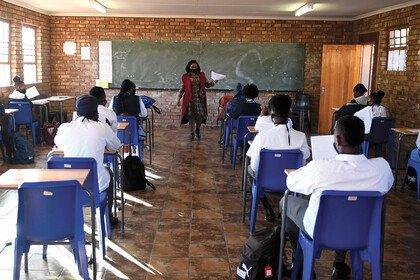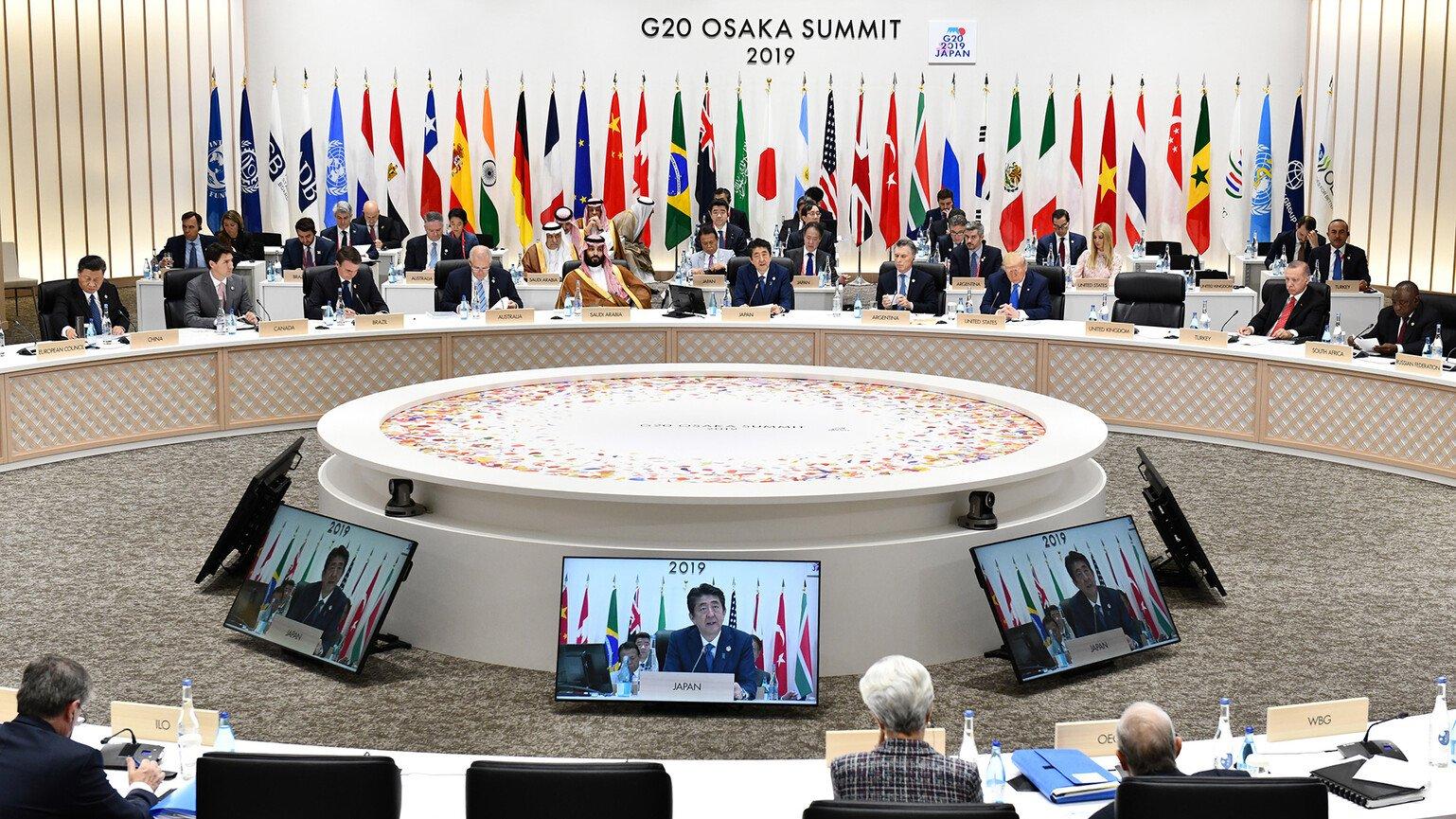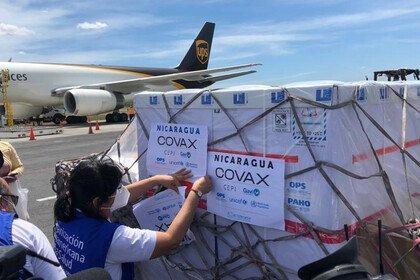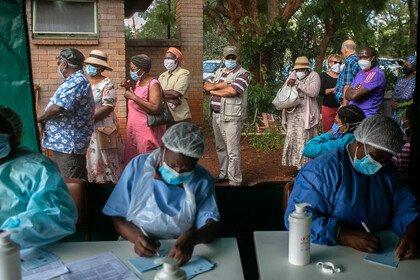
Failure of political leadership – and imagination – is holding back the Covid-19 recovery
The G20 Global Health Summit in Rome this week could change the course of the Covid-19 pandemic, but only if political leaders decide to fully finance the ACT-Accelerator.

Pool / Getty Images
Crises can tell us a lot about ourselves. The human instinct is to fight or flight. But when societies, countries, whole regions of the world are in crisis, what then? Do we look inwards or outwards for solutions?
We’re in the middle of the biggest global crisis of the 21st century
Science, economics and public opinion are telling us that we can’t solve this problem on our own: our only sustainable way out of the pandemic is through collective action.
We know how to defeat this virus and have tools to do it: vaccines, tests and treatments. We also have initiatives like the ACT-Accelerator to make these tools available more equitably around the world. But we are missing the courageous political leadership needed to tackle the virus everywhere.
Our leaders have been under incredible pressure over the last year. Dealing with an unprecedented pandemic has forced them to grapple with domestic and international challenges with no easy solutions. Understandably, they have prioritised their domestic response and recovery. But it has become increasingly apparent – with the spread of new variants – that no country can afford to look inwards only.
Pressing play on the video above will set a third-party cookie. Please read our cookie policy for more information.
Leaders of G7 and G20 countries have a chance to make history by agreeing to fully finance the ACT-Accelerator, sharing excess doses and ensuring science can keep pace with the pandemic.
History reminds us, when the world is faced with an unsurmountable challenge, the greatest leaders stand together and act in the common interest of all.
Together, we can achieve great things “not because they are easy, but because they are hard”.
00:18
Covid-19 is the greatest challenge of our time – a global crisis the world has not seen in a generation.
Science has provided the first tests, treatments and vaccines needed to save lives.
But with a growing divide between the haves and have nots, we risk leaving people behind.
00:41
No one is safe until everyone is safe.
The WHO ACT-Accelerator is the only global collaboration that can see us through this.
But with a critical funding gap, we urgently call on world leaders to stand together and share the burden of responsibility fairly.
01:02
To fully fund the ACT-Accelerator, to immediately share surplus vaccines and ensure science keeps pace with the pandemic.
This investment will save lives. It will prevent health systems collapsing. It will restore global economies.
We must act decisively. Not individually, but collectively.
01:25
Now is the time to pull the world back from the precipice of immeasurable suffering.
To make decisions that will be remembered for 100 years, as we remember the might, and collective endeavour of our heroes, both past and present.
The time to act is now, to act together, to save lives, to invest in the ACT-Accelerator.
We need urgent, collective action
Countries like Canada, Germany and Norway have shown that it is possible to respond nationally and contribute generously to the global response by financing the ACT-Accelerator. We urgently need more G7 and G20 leaders to follow their lead. Without concerted collective action, where each country contributes their fair share, this pandemic will rage for much longer than it should. That will translate into many more lives and livelihoods lost.
The G20 Global Health Summit in Rome this week offers an important opportunity for political leaders to change the course of this pandemic by choosing to fully and fairly finance the ACT-Accelerator. History will judge them poorly if they allow Covid-19 to continue to entrench deep inequalities globally.
The ACT-Accelerator has already expanded access to scientific advances in the last year. It has delivered the first vaccines to low- and middle-income countries, significantly reduced the costs of tests, procured personal protective equipment and secured access to the first proven Covid-19 treatments. However, this hard-won progress is at grave risk due to significant underfunding. An $18.5 billion funding gap for the ACT-Accelerator is hindering the rollout of Covid-19 tools in many low- and middle-income countries.
The longer some countries go without Covid-19 vaccines, tests and treatments, the more the virus will continue to spread, mutate and threaten all of us. Failure to ensure access to Covid-19 tools through the ACT-Accelerator is already costing us millions of lives, and could cause the global economy to lose $9.2 trillion in 2021. As much as half of this economic loss would fall on advanced economies like the G20 member states.

Sources: International Chamber of Commerce, International Monetary Fund and World Health Organization.
Data is accurate as of 2 June 2021.
Progress is possible when we work together
The G20 countries could easily prevent this scenario by agreeing to fully finance the ACT-Accelerator this week. By sharing the financial costs fairly across the group, they could cover almost 90 per cent of what is currently needed to make sure Covid-19 tools are equitably distributed around the world.
This is not unprecedented. Smallpox was eradicated because the world’s richest countries agreed, at the World Health Assembly in 1967, to share the financial costs to make it happen. Twelve years later, smallpox was eradicated worldwide. This is one of humanity’s greatest achievements. It showed us what was possible when we worked together, and set us on a path of rapid progress on global health over the last five decades – progress that is under threat from the prolonged pandemic.
The G20 Global Health Summit in Rome could be this pivotal moment for Covid-19, one that we would remember for centuries to come. The moment has passed for piecemeal contributions to the ACT-Accelerator that secure headlines but prolong the pandemic.
It is now time for political leaders across the G20 to look outwards and contribute their fair share to making tests, treatments and vaccines available to all.
It is time to act collectively and courageously.
Wellcome and the ACT-Accelerator partners are asking the European Commission to urgently consolidate their financial support for the ACT-Accelerator with a 1.2 billion Euro pledge. Read the statement [PDF 104KB].


